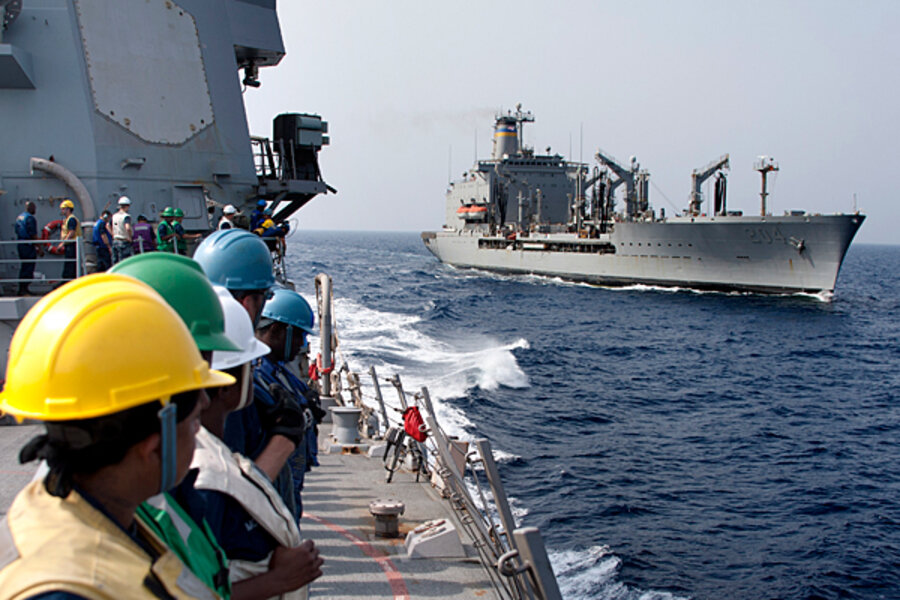US Navy fires on fishing boat in sensitive Strait of Hormuz
Loading...
A small boat approaches a US Navy ship in the Persian Gulf. The US Navy ship fires warning shots to alert the small boat to stay clear, and when it doesn’t comply, the US Navy ship opens fire on the boat. One unarmed fisherman is killed, and two others are wounded.
These are the details that have emerged thus far from yesterday’s incident, between the USS Rappahannock – a refueling ship with US Fifth Fleet – and a tiny fishing boat registered to a company in the United Arab Emirates, but manned by Indian nationals. Both the US Navy and the government of the UAE have promised an investigation, and the US State Department has offered its condolences to the families of the killed and wounded.
With the US Navy patrolling the Persian Gulf, ramping up pressure on Iran to abandon what Washington alleges is an advanced Iranian nuclear weapons program, incidents like this one are sadly predictable.
The Persian Gulf is one of the busiest commercial sea lanes in the world. About 40 percent of the world’s seaborne oil exports passes through the Strait of Hormuz, and commercial fishermen still ply these waters to supply fish to the increasingly wealthy citizens of both sides of the gulf. The chances of US navy ships, Iranian naval ships, and commercial vessels coming into close proximity are great.
The US State Department said that the Rappahannock had opened fire on the fishing boat only as a last resort.
"An embarked security team aboard a US navy vessel fired upon a small motor vessel after it disregarded warnings and rapidly approached the US ship near Jebel Ali," the State Department statement said. Jebel Ali is a port city in the UAE.
"The US crew repeatedly attempted to warn the vessel's operators to turn away from their deliberate approach,” the statement said. "When those efforts failed to deter the approaching vessel, the security team on the Rappahannock fired rounds from a .50-calibre machine gun."
Biggest fear
While firing on a small fishing boat may seem excessive, it was precisely this kind of scenario that US Navy planners fear the most in tense times like this. In October 2000, a small boat packed with explosives rammed into the USS Cole while it was refueling in the Yemeni port of Aden, killing 17 sailors. In May, a US military drone strike killed the suspected Al Qaeda militant who is believed to have organized the attack on the USS Cole.
US Ambassador to India Nancy Powell conveyed her condolences to the Indian families of the killed and wounded, and promised an investigation. And India’s Ministry of Foreign Affairs said that it would request an investigation by both the US and the UAE governments.
Iran, however, is not letting the incident drop, and has warned that the increasing US military presence in the Persian Gulf is a national security threat, not just to Iran but to the whole region.
“We have announced time and again that the presence of foreign forces can be a threat to regional security," Reuters news agency quoted Iranian foreign ministry spokesman Ramin Mehmanparast as saying.
"Certainly regional countries with the help of one another can provide security in the best possible way. If they join hands, with their defensive capabilities, they don't need the presence of foreign forces. Anywhere where you see insecurity we have always seen the hand of foreign forces there."
Iran itself has threatened to choke off the Strait of Hormuz, if it feels threatened by Western pressure over its nuclear weapons programs. Iran sees those threats more as a “deterrent” to the West, since a cutoff of oil exports would have profound effects on Western economies reliant on Middle Eastern oil.
Who has the upper hand?
The West would appear, at first glance, to have the upper hand in this dispute with Iran. The US Navy is predominant, not just in the Persian Gulf, but globally. With its naval base in Bahrain, and good relations with the Gulf Cooperation Council (Saudi Arabia, United Arab Emirates, Qatar, Bahrain, Kuwait, and Oman), the US can sustain its naval pressure on Iran, and its protective presence in the Strait of Hormuz for quite some time.
But as the Suez Crisis of 1956 shows, overwhelming force is sometimes not enough. Western alliances can fall apart quickly if oil supplies are threatened, something that the British and French governments learned when US President Dwight Eisenhower failed to back them up in their Suez Canal intervention.
Incidents such as yesterday’s firing on the fishing boat, too, can create pressure of a different sort. If it turns out that the US Navy was at fault in the incident, GCC governments may come under increasing pressure from their own citizens to demand the US to scale back operations.







